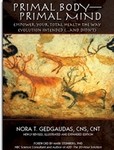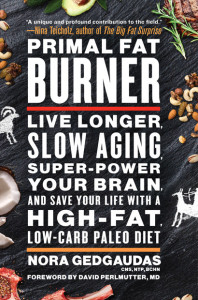Q: I am almost through your book and am finding it very interesting and informative. I also listened to your interview with Jimmy Moore on iTunes and am getting acquainted with your blog. I have followed a low carb plan for about 5 years but am seeking to hone it to accomplish some personal goals – I want to lose about 40 lbs and increase my energy levels and stamina. I understand from your book that we want to aim for adequate but not excessive protein, which appears to be about .50 gram per 1 lb body weight. Then we fill in the remainder of the diet with fat and vegetables. I am wondering about calories for weight loss, which I don’t see anything specific covered in your book. If you eat properly (converting to a fat-burning metabolism), is weight loss dependent on a calorie deficit? If so, how low would you recommend? Lets assume that a person has a large appetite (me!) and loves fat and protein, so she doesn’t trust satiety as the sole guideline for regulation. I read in your book that excess fat will convert to glucose – even in the absence of carbohydrate – and be stored as fat, though this is an inefficient process, so I’m concerned about overeating. Any specific guidelines for weight loss would be appreciated. Thanks for providing great information to the public on this important topic.
~ Marie
A: I’m glad you are enjoying my book!
I take on the whole issue of calories on pages 163-164 of Primal Body-Primal Mind.
I am not a fan of calorie counting for weight loss or anything else, which is why I shy away from caloric guidelines. Typically, using fat to satisfy your appetite as a guide your caloric intake should be self limiting. Keep in mind, too, that a calorie isn’t a calorie isn’t a calorie in the human body. Not all food or macronutrients we consume ends up as energy. Most of what we consume with regard to protein (within adequate ranges) goes to maintaining and rebuilding structure and serves as a substrate (in the form of amino acids) for things like hormones, neurotransmitters and close to 50,000 other substances. Fat, too, serves as structure for cellular membranes in the body, makes up most of the structure of the brain and is a substrate for innumerable substances metabolically having nothing to do with energy production. Carbohydrates (sugar and starch), however, contribute negligibly to structure and almost exclusively generate energy (or energy storage in the form of glycogen and/or body fat).
If you were going to count calories for anything, it would be utilizable carbs. Otherwise, by eliminating sugar and starch from the equation, eating as many fibrous vegetables and greens as you want for bulk, moderating protein and eating just enough fat to satisfy your appetite you achieve an automatically self-limiting “caloric intake” and don’t need to worry so much about the numbers. Weight loss/weight normalization is a natural consequence of carb avoidance.
Also, when you eat enough fat (to the exclusion of carbohydrates such as sugars and starch) you send a message to the hypothalamus that “hunting is good” and that fat stores (which mean survival to our primal physiology) are expendable. Once you metabolically adapt to being a “fat burner” instead of a “sugar burner” the fat loss will come naturally.
~ Nora




Marie,
You may want to add some weight-bearing exercise to build muscle — we tend to lose it steadily as we get older, but it is active and burns calories just sitting there. Tom Venuto has a some e-books specifically about losing weight, which helped my husband lose about fifty pounds and keep if off.
Tracking your food intake by Fitday or Excel for a month can be very useful. You can see how much you are eating — then sit and stare at the numbers and wonder if you were really hungry or just Hoovering up the food for fun.
I like to fill up with nourishing broths and soups as well as salads for dinner. I can eat so much dinner I feel sick sometimes — either dinner is yummier or digestion is slower in the evening! If I eat small meals throughout the day I feel better. It is also easy to eat too much nut butter and too many nuts.
You might also find Robb Wolf helpful, he is a strength and conditioning coach in California and he has an interesting podcast called the Paleolithic Solution. (Swears like a trucker though, or a… well, a coach.)
By the way, I am a weight-training athlete so 1g of protein per pound of bodyweight works better for me — I maintain a very low bodyfat level and recover from my workouts. (Plenty of fat, too.)
Hope this was helpful!
Vanessa
P.S. I love your book, Nora. I bought a copy to lend out at my gym!